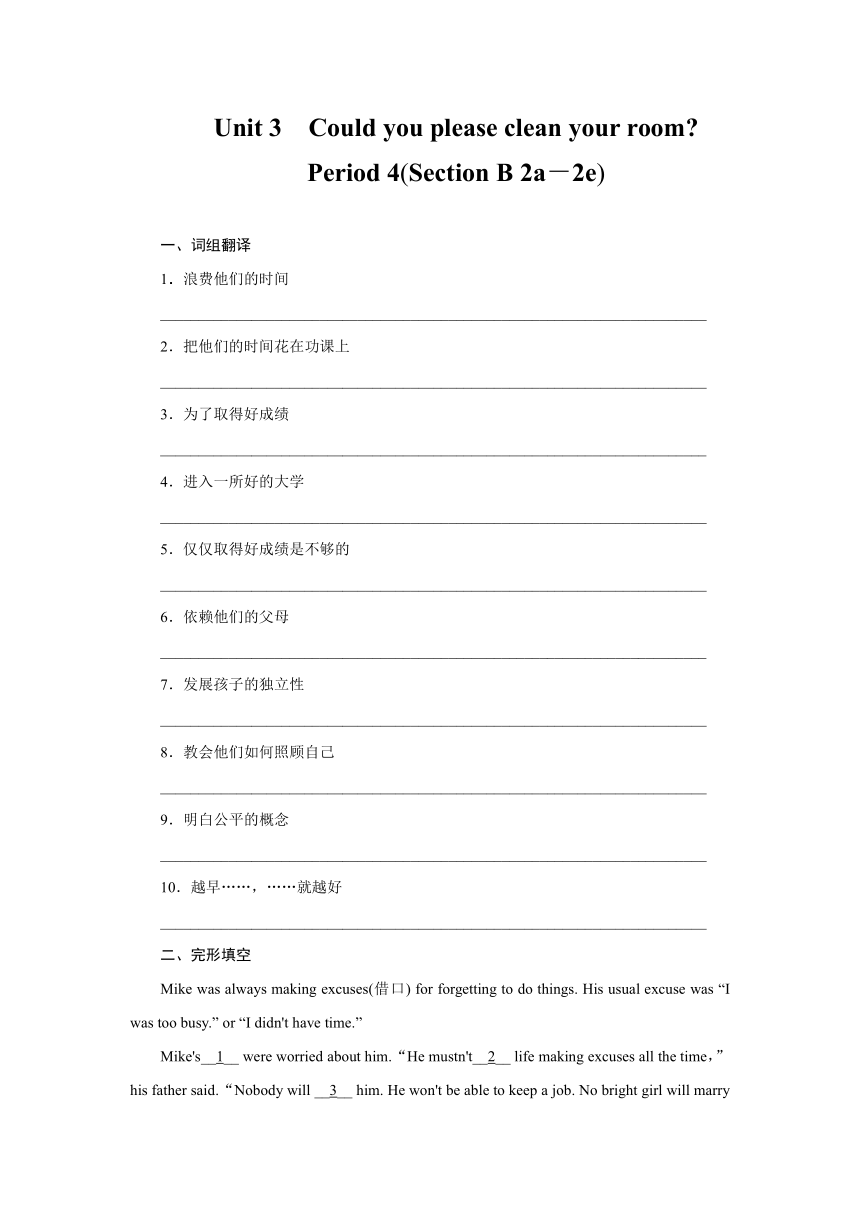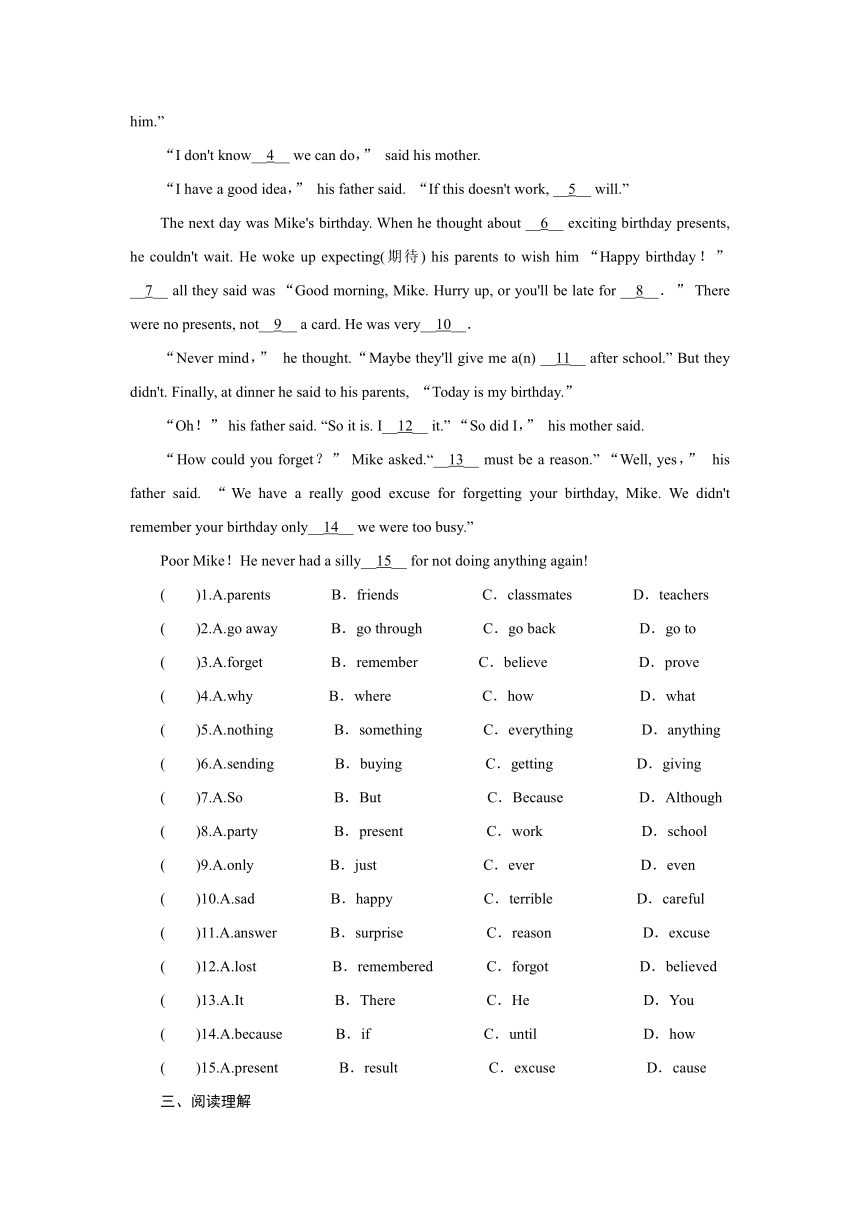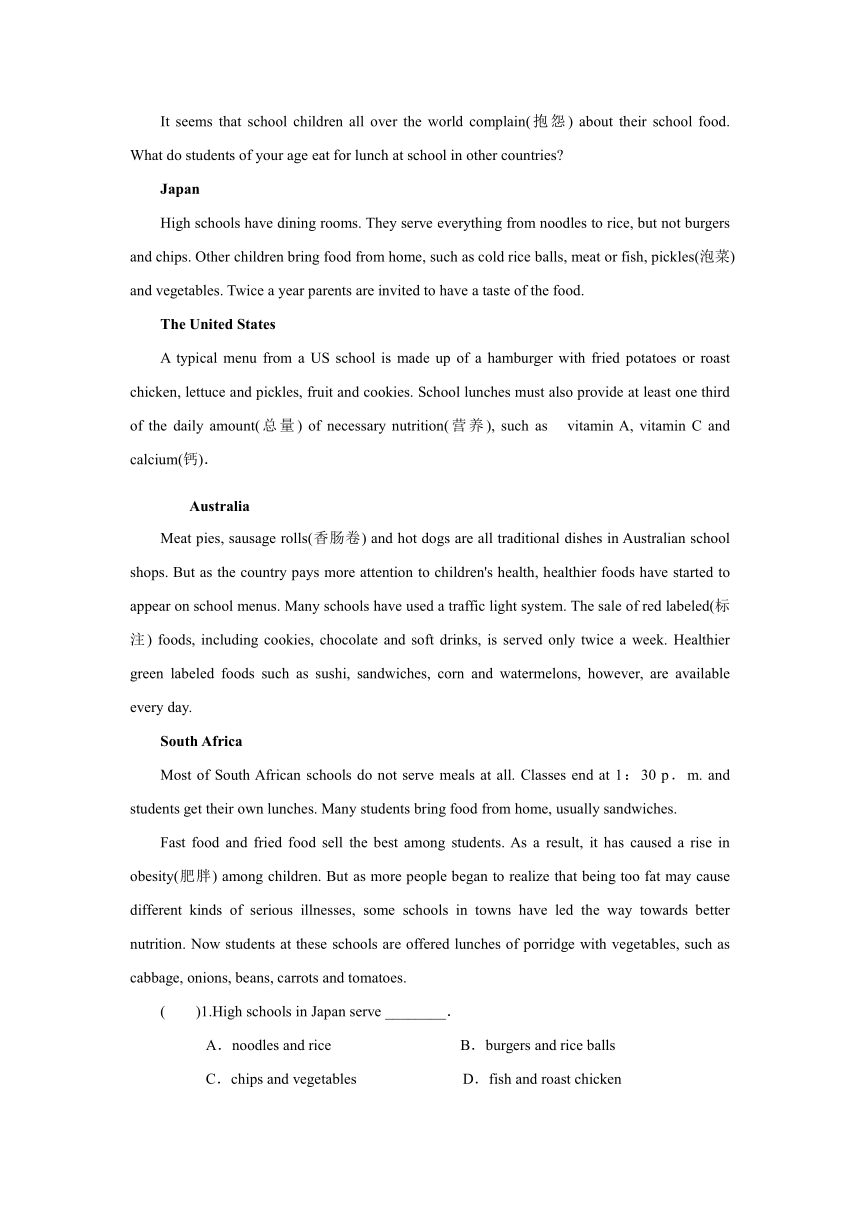人教版八年级下册Unit 3 Could you please clean your room?Section B 课后作业(含答案)
文档属性
| 名称 | 人教版八年级下册Unit 3 Could you please clean your room?Section B 课后作业(含答案) |  | |
| 格式 | zip | ||
| 文件大小 | 52.1KB | ||
| 资源类型 | 教案 | ||
| 版本资源 | 人教新目标(Go for it)版 | ||
| 科目 | 英语 | ||
| 更新时间 | 2023-01-07 18:08:40 | ||
图片预览



文档简介
Unit 3 Could you please clean your room
Period 4(Section B 2a-2e)
一、词组翻译
1.浪费他们的时间
________________________________________________________________________
2.把他们的时间花在功课上
________________________________________________________________________
3.为了取得好成绩
________________________________________________________________________
4.进入一所好的大学
________________________________________________________________________
5.仅仅取得好成绩是不够的
________________________________________________________________________
6.依赖他们的父母
________________________________________________________________________
7.发展孩子的独立性
________________________________________________________________________
8.教会他们如何照顾自己
________________________________________________________________________
9.明白公平的概念
________________________________________________________________________
10.越早……,……就越好
________________________________________________________________________
二、完形填空
Mike was always making excuses(借口) for forgetting to do things. His usual excuse was “I was too busy.” or “I didn't have time.”
Mike's__1__ were worried about him.“He mustn't__2__ life making excuses all the time,” his father said.“Nobody will __3__ him. He won't be able to keep a job. No bright girl will marry him.”
“I don't know__4__ we can do,” said his mother.
“I have a good idea,” his father said. “If this doesn't work, __5__ will.”
The next day was Mike's birthday. When he thought about __6__ exciting birthday presents, he couldn't wait. He woke up expecting(期待) his parents to wish him “Happy birthday!” __7__ all they said was “Good morning, Mike. Hurry up, or you'll be late for __8__.” There were no presents, not__9__ a card. He was very__10__.
“Never mind,” he thought.“Maybe they'll give me a(n) __11__ after school.” But they didn't. Finally, at dinner he said to his parents, “Today is my birthday.”
“Oh!” his father said. “So it is. I__12__ it.” “So did I,” his mother said.
“How could you forget?” Mike asked.“__13__ must be a reason.” “Well, yes,” his father said. “We have a really good excuse for forgetting your birthday, Mike. We didn't remember your birthday only__14__ we were too busy.”
Poor Mike!He never had a silly__15__ for not doing anything again!
( )1.A.parents B.friends C.classmates D.teachers
( )2.A.go away B.go through C.go back D.go to
( )3.A.forget B.remember C.believe D.prove
( )4.A.why B.where C.how D.what
( )5.A.nothing B.something C.everything D.anything
( )6.A.sending B.buying C.getting D.giving
( )7.A.So B.But C.Because D.Although
( )8.A.party B.present C.work D.school
( )9.A.only B.just C.ever D.even
( )10.A.sad B.happy C.terrible D.careful
( )11.A.answer B.surprise C.reason D.excuse
( )12.A.lost B.remembered C.forgot D.believed
( )13.A.It B.There C.He D.You
( )14.A.because B.if C.until D.how
( )15.A.present B.result C.excuse D.cause
三、阅读理解
It seems that school children all over the world complain(抱怨) about their school food. What do students of your age eat for lunch at school in other countries
Japan
High schools have dining rooms. They serve everything from noodles to rice, but not burgers and chips. Other children bring food from home, such as cold rice balls, meat or fish, pickles(泡菜) and vegetables. Twice a year parents are invited to have a taste of the food.
The United States
A typical menu from a US school is made up of a hamburger with fried potatoes or roast chicken, lettuce and pickles, fruit and cookies. School lunches must also provide at least one third of the daily amount(总量) of necessary nutrition(营养), such as vitamin A, vitamin C and calcium(钙).
Australia
Meat pies, sausage rolls(香肠卷) and hot dogs are all traditional dishes in Australian school shops. But as the country pays more attention to children's health, healthier foods have started to appear on school menus. Many schools have used a traffic light system. The sale of red labeled(标注) foods, including cookies, chocolate and soft drinks, is served only twice a week. Healthier green labeled foods such as sushi, sandwiches, corn and watermelons, however, are available every day.
South Africa
Most of South African schools do not serve meals at all. Classes end at 1:30 p.m. and students get their own lunches. Many students bring food from home, usually sandwiches.
Fast food and fried food sell the best among students. As a result, it has caused a rise in obesity(肥胖) among children. But as more people began to realize that being too fat may cause different kinds of serious illnesses, some schools in towns have led the way towards better nutrition. Now students at these schools are offered lunches of porridge with vegetables, such as cabbage, onions, beans, carrots and tomatoes.
( )1.High schools in Japan serve ________.
A.noodles and rice B.burgers and rice balls
C.chips and vegetables D.fish and roast chicken
( )2.From the passage, we know the typical menu from a US school is ________.
A.delicious B.quite healthy C.not very healthy D.popular in South Africa
( )3.Which are traditional dishes in Australia
A.Meat pies and hot dogs. B.Chocolate and soft drinks.
C.Cookies and sushi. D.Sandwiches and corn.
( )4.In South Africa, ________.
A.most students have sandwiches and vegetables for lunch
B.students like fast food and fried food very much
C.more and more students become ill
D.students realized that fast food and fried food were bad for their health
( )5.Which of the following is NOT true
A.Parents in Japan are invited to taste the food twice a year.
B.In the United States, school lunches must provide at least one third of the daily amount of necessary nutrition.
C.In Australia, many schools have used a traffic light system.
D.In South Africa, schools don't serve meals.
四、根据句意及汉语提示完成句子
1.He does nothing all day. He is just ________(浪费) his time.
2.They ________(提供) him with a good job when he was in Japan.
3.It's very important for parents to develop their kids' ________(独立性).
4.Do you get on well with your ________(邻居)
5.Here are the ________(结果) of the competition.
6.He didn't work hard and his grades ________(下降).
7.These days students have lots of ________(压力) at school.
8.It's too expensive and ________(而且) it really doesn't suit you.
9.Everyone should do their part in ________(保持) the room clean and tidy.
10.We should try our best to make our ________(环境) comfortable.
五、语法填空
阅读下面短文,按照句子结构的语法性和上下文连贯的要求,在空格处填入一个适当的词或使用括号中词语的正确形式填空(每空不多于3个单词)。
Sam hated doing chores. And he had many chores. For example, on Mondays, Wednesdays and Fridays he took 1 the rubbish. And on weekends he always washed his
2 (father) car. He also cleaned his 3 room once a week. What a chore it was! Sometimes he even had to look after his little sister and brother.
Sam had a foreign friend at school. His name was Kumar. Doing chores in Kumar's family was very different. In the house only the girls did chores. His sisters 4 (make) all the beds and cleaned all the rooms, too, even his bedroom. His mother always cooked the meals, and his sisters helped her to go shopping, and prepare the food. They worked hard at home,
5 (do) all the chores with their mother. So when Kumar talked to his friend Sam about chores, he felt very 6 (luck).
One day, Sam had an idea. He asked Kumar, “Could I borrow your sisters?” He wanted them 7________(help) him clean his room, but they said “No”. Instead, they asked Sam to teach their brother 8 to do chores, so he could make his own bed.
Sam and Kumar are very good 9 science. They are going to be 10 (science) after finishing university. They want to make a robot to do chores. Then everyone—mothers and fathers, sons and daughters—will be happy!
参考答案
Period 4
一、1.a waste of their time 2.spend their time on schoolwork 3.in order to get good grades
4.get into a good university 5.be not enough to just get good grades 6.depend on their
parents 7.develop children's independence 8.teach them how to look after themselves 9.understand the idea of fairness 10.the earlier..., the better...
二、1—5.ABCDA 6—10.CBDDA 11—15.BCBAC
三、1—5.ACABD
四、1.wasting 2.provided 3.independence 4.neighbor(s) 5.results 6.dropped
7.stress/ pressure 8.anyway 9.keeping 10.environment
五、1.out 2.father's 3.own 4.made 5.doing 6.lucky 7.to help 8.how 9.at
10.scientists
Period 4(Section B 2a-2e)
一、词组翻译
1.浪费他们的时间
________________________________________________________________________
2.把他们的时间花在功课上
________________________________________________________________________
3.为了取得好成绩
________________________________________________________________________
4.进入一所好的大学
________________________________________________________________________
5.仅仅取得好成绩是不够的
________________________________________________________________________
6.依赖他们的父母
________________________________________________________________________
7.发展孩子的独立性
________________________________________________________________________
8.教会他们如何照顾自己
________________________________________________________________________
9.明白公平的概念
________________________________________________________________________
10.越早……,……就越好
________________________________________________________________________
二、完形填空
Mike was always making excuses(借口) for forgetting to do things. His usual excuse was “I was too busy.” or “I didn't have time.”
Mike's__1__ were worried about him.“He mustn't__2__ life making excuses all the time,” his father said.“Nobody will __3__ him. He won't be able to keep a job. No bright girl will marry him.”
“I don't know__4__ we can do,” said his mother.
“I have a good idea,” his father said. “If this doesn't work, __5__ will.”
The next day was Mike's birthday. When he thought about __6__ exciting birthday presents, he couldn't wait. He woke up expecting(期待) his parents to wish him “Happy birthday!” __7__ all they said was “Good morning, Mike. Hurry up, or you'll be late for __8__.” There were no presents, not__9__ a card. He was very__10__.
“Never mind,” he thought.“Maybe they'll give me a(n) __11__ after school.” But they didn't. Finally, at dinner he said to his parents, “Today is my birthday.”
“Oh!” his father said. “So it is. I__12__ it.” “So did I,” his mother said.
“How could you forget?” Mike asked.“__13__ must be a reason.” “Well, yes,” his father said. “We have a really good excuse for forgetting your birthday, Mike. We didn't remember your birthday only__14__ we were too busy.”
Poor Mike!He never had a silly__15__ for not doing anything again!
( )1.A.parents B.friends C.classmates D.teachers
( )2.A.go away B.go through C.go back D.go to
( )3.A.forget B.remember C.believe D.prove
( )4.A.why B.where C.how D.what
( )5.A.nothing B.something C.everything D.anything
( )6.A.sending B.buying C.getting D.giving
( )7.A.So B.But C.Because D.Although
( )8.A.party B.present C.work D.school
( )9.A.only B.just C.ever D.even
( )10.A.sad B.happy C.terrible D.careful
( )11.A.answer B.surprise C.reason D.excuse
( )12.A.lost B.remembered C.forgot D.believed
( )13.A.It B.There C.He D.You
( )14.A.because B.if C.until D.how
( )15.A.present B.result C.excuse D.cause
三、阅读理解
It seems that school children all over the world complain(抱怨) about their school food. What do students of your age eat for lunch at school in other countries
Japan
High schools have dining rooms. They serve everything from noodles to rice, but not burgers and chips. Other children bring food from home, such as cold rice balls, meat or fish, pickles(泡菜) and vegetables. Twice a year parents are invited to have a taste of the food.
The United States
A typical menu from a US school is made up of a hamburger with fried potatoes or roast chicken, lettuce and pickles, fruit and cookies. School lunches must also provide at least one third of the daily amount(总量) of necessary nutrition(营养), such as vitamin A, vitamin C and calcium(钙).
Australia
Meat pies, sausage rolls(香肠卷) and hot dogs are all traditional dishes in Australian school shops. But as the country pays more attention to children's health, healthier foods have started to appear on school menus. Many schools have used a traffic light system. The sale of red labeled(标注) foods, including cookies, chocolate and soft drinks, is served only twice a week. Healthier green labeled foods such as sushi, sandwiches, corn and watermelons, however, are available every day.
South Africa
Most of South African schools do not serve meals at all. Classes end at 1:30 p.m. and students get their own lunches. Many students bring food from home, usually sandwiches.
Fast food and fried food sell the best among students. As a result, it has caused a rise in obesity(肥胖) among children. But as more people began to realize that being too fat may cause different kinds of serious illnesses, some schools in towns have led the way towards better nutrition. Now students at these schools are offered lunches of porridge with vegetables, such as cabbage, onions, beans, carrots and tomatoes.
( )1.High schools in Japan serve ________.
A.noodles and rice B.burgers and rice balls
C.chips and vegetables D.fish and roast chicken
( )2.From the passage, we know the typical menu from a US school is ________.
A.delicious B.quite healthy C.not very healthy D.popular in South Africa
( )3.Which are traditional dishes in Australia
A.Meat pies and hot dogs. B.Chocolate and soft drinks.
C.Cookies and sushi. D.Sandwiches and corn.
( )4.In South Africa, ________.
A.most students have sandwiches and vegetables for lunch
B.students like fast food and fried food very much
C.more and more students become ill
D.students realized that fast food and fried food were bad for their health
( )5.Which of the following is NOT true
A.Parents in Japan are invited to taste the food twice a year.
B.In the United States, school lunches must provide at least one third of the daily amount of necessary nutrition.
C.In Australia, many schools have used a traffic light system.
D.In South Africa, schools don't serve meals.
四、根据句意及汉语提示完成句子
1.He does nothing all day. He is just ________(浪费) his time.
2.They ________(提供) him with a good job when he was in Japan.
3.It's very important for parents to develop their kids' ________(独立性).
4.Do you get on well with your ________(邻居)
5.Here are the ________(结果) of the competition.
6.He didn't work hard and his grades ________(下降).
7.These days students have lots of ________(压力) at school.
8.It's too expensive and ________(而且) it really doesn't suit you.
9.Everyone should do their part in ________(保持) the room clean and tidy.
10.We should try our best to make our ________(环境) comfortable.
五、语法填空
阅读下面短文,按照句子结构的语法性和上下文连贯的要求,在空格处填入一个适当的词或使用括号中词语的正确形式填空(每空不多于3个单词)。
Sam hated doing chores. And he had many chores. For example, on Mondays, Wednesdays and Fridays he took 1 the rubbish. And on weekends he always washed his
2 (father) car. He also cleaned his 3 room once a week. What a chore it was! Sometimes he even had to look after his little sister and brother.
Sam had a foreign friend at school. His name was Kumar. Doing chores in Kumar's family was very different. In the house only the girls did chores. His sisters 4 (make) all the beds and cleaned all the rooms, too, even his bedroom. His mother always cooked the meals, and his sisters helped her to go shopping, and prepare the food. They worked hard at home,
5 (do) all the chores with their mother. So when Kumar talked to his friend Sam about chores, he felt very 6 (luck).
One day, Sam had an idea. He asked Kumar, “Could I borrow your sisters?” He wanted them 7________(help) him clean his room, but they said “No”. Instead, they asked Sam to teach their brother 8 to do chores, so he could make his own bed.
Sam and Kumar are very good 9 science. They are going to be 10 (science) after finishing university. They want to make a robot to do chores. Then everyone—mothers and fathers, sons and daughters—will be happy!
参考答案
Period 4
一、1.a waste of their time 2.spend their time on schoolwork 3.in order to get good grades
4.get into a good university 5.be not enough to just get good grades 6.depend on their
parents 7.develop children's independence 8.teach them how to look after themselves 9.understand the idea of fairness 10.the earlier..., the better...
二、1—5.ABCDA 6—10.CBDDA 11—15.BCBAC
三、1—5.ACABD
四、1.wasting 2.provided 3.independence 4.neighbor(s) 5.results 6.dropped
7.stress/ pressure 8.anyway 9.keeping 10.environment
五、1.out 2.father's 3.own 4.made 5.doing 6.lucky 7.to help 8.how 9.at
10.scientists
同课章节目录
- Unit 1 What's the matter?
- Section A
- Section B
- Unit 2 I'll help to clean up the city parks.
- Section A
- Section B
- Unit 3 Could you please clean your room?
- Section A
- Section B
- Unit 4 Why don't you talk to your parents?
- Section A
- Section B
- Unit 5 What were you doing when the rainstorm came
- Section A
- Section B
- Review of Units 1-5
- Unit 6 An old man tried to move the mountains.
- Section A
- Section B
- Unit 7 What's the highest mountain in the world?
- Section A
- Section B
- Unit 8 Have you read Treasure Island yet?
- Section A
- Section B
- Unit 9 Have you ever been to a museum?
- Section A
- Section B
- Unit 10 I've had this bike for three years.
- Section A
- Section B
